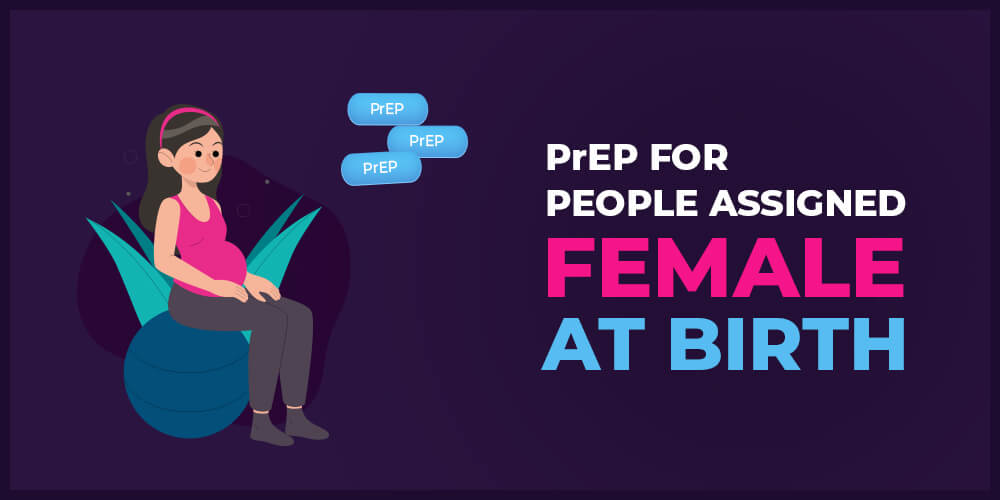In the US, over 30,000 people test positive for HIV every year (30,635 in 2020). HIV is a virus that is spread through certain body fluids and can affect anyone, regardless of gender, age, or sexual orientation.
With so many people at risk of contracting HIV, PrEP (pre-exposure prophylaxis) has been a revelation. Administered to high-risk groups, PrEP is a combination of medications that reduces the chance of HIV transmission by up to 99%.
HIV doesn’t discriminate among genders, and millions of people assigned female at birth (AFABs) are at risk of transmission. It is crucial for everyone to understand the methods of protection that are readily available.
So, what do you need to know about PrEP for people assigned female at birth? Let’s dive in.
Why Should People Assigned Female at Birth Take PrEP?
PrEP has proven to be highly effective at preventing HIV when taken consistently and correctly. It is available in pill form (taken daily) or as an injectable (administered by a healthcare professional several times a year).
PrEP is recommended to most people who are at risk of HIV, such as those who have recently been diagnosed with an STD, have engaged in intercourse with a person whose HIV status is unknown, or have participated in high-risk sexual behavior (e.g., unprotected sex). It is also recommended for partners of HIV-positive people and those who have used shared needles or syringes.
For their own safety, anyone who falls in this category—whether women, nonbinary individuals, or trans people—should take PrEP.
An important note to make at this point is that the effectiveness of PrEP for AFABs can vary. For male patients, PrEP pills can reach maximum protection within seven days of continued use. For people assigned female at birth, it does not achieve maximum protection until it has been taken for 21 consecutive days. This is due to protective enzymes present in vaginal tissue. During this three-week period, it’s essential to continue practicing safe sex.
What PrEP Medications Are Available to People Assigned Female at Birth?
PrEP medications available for people assigned female at birth include:
Truvada
Approved in 2012, Truvada is an oral medication taken once a day and can prevent the transmission of HIV sexually by 99% and through injection drug use by 74%. Truvada is a combination of two drugs: emtricitabine and tenofovir disoproxil fumarate. It is generally considered safe for people assigned female at birth, as well as women who are pregnant or breastfeeding.
Some common side effects include cold or flu symptoms, including fever, chills, nasal congestion, and sore throat. It can also cause rashes, headaches, and abdominal pain. Fortunately, these symptoms are expected only during the “up-start” period and should dissipate over time.
Less common side effects of this HIV PrEP for AFABs medication include vision changes and worsening of hepatitis B symptoms have also been seen in some people who take Truvada. Consult a healthcare professional before starting any PrEP regimen.
Apretude
Apretude is a recent addition to HIV prevention medication that has proven safe for women and people assigned female at birth. It is an injectable version of PrEP administered by healthcare professionals once every two months.
Apart from being long-lasting, Apretude is the prevention method of choice by people who have trouble swallowing pills or cannot take medication daily for any reason.
Some side effects are associated with this injectable PrEP medication: allergic reactions, rashes, liver problems, depression, or mood changes. It’s also important to note that the effects of Apretude on pregnant people haven’t been studied.
Again, contact your healthcare professional before starting any medication.
How to Access PrEP for People Assigned Female at Birth
PrEP medication has become one of the most convenient forms of protection for people at risk of contracting HIV. They are widely available in many countries worldwide, and their accessibility is constantly improving.
Most PrEP medications are included in health insurance plans and are very cost-effective. While Apretude is still new, some providers have begun including it in their list as well.
If you don’t know where to start, ask your healthcare provider or look up PrEP-certified programs (such as PrEP Daily). These programs offer support and information about PrEP access, cost coverage, and more.
For people assigned female at birth who plan to take Truvada, a few checks and balances must be maintained. Because the drug has a tendency to affect the kidneys and liver, it’s important to undergo routine testing to check HIV viral load levels, kidney and liver function, and bone density.
What Else Can Those Assigned Female at Birth Do to Protect Themselves?
While PrEP results are indeed promising, they are not the only types of protection one must take against HIV. Practicing safe sex with the use of condoms must continue. PrEP medication works best when used along with other methods of HIV prevention.
It cannot be stressed enough that for at-risk groups, regular testing is a must. This can detect an HIV threat in its early stages when it is much easier to treat.
The Wrap-Up
Preventing HIV is crucial for all at-risk groups, regardless of age or gender. People assigned female at birth must care about their protection just as much as males and trans people. However, there are some differences and checks and balances that must be considered when choosing the best prevention method.
Need help accessing PrEP? PrEP Daily is here to help. Our PrEP Navigators are specially trained to provide up-to-date information and guidance on PrEP for people assigned female access, cost coverage, and more.
Get in touch with us today to find out how PrEP can work for you. Together we can make HIV prevention a seamless part of everyday life.

